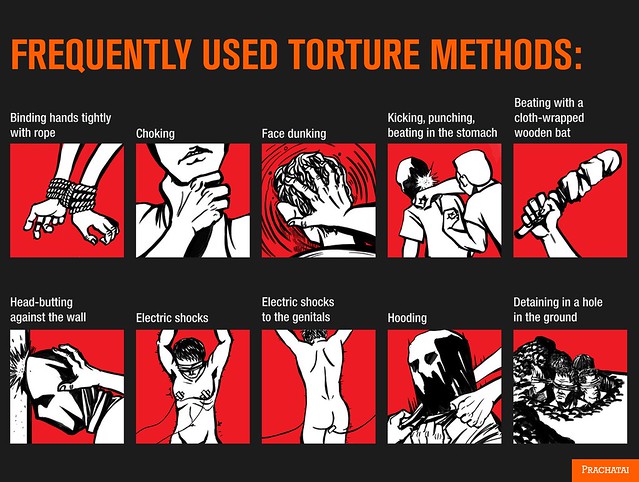The junta has refuted condemnations from many human rights groups for obstructing an Amnesty International (AI) progress briefing about torture, saying that it did not prevent the briefing. The junta added that information from Amnesty International (AI) is not credible.
On 29 September 2016, Col Winthai Suvaree, spokesperson of the National Council for Peace and Order (NCPO), announced that the authorities did not ban the press briefing held on 28 September to release an AI report titled “Make Him Speak by Tomorrow: Torture and Other Ill-Treatment in Thailand”, Matichon Online reported.
Confirming the justification given by staff from the Department of Labour Protection and Welfare and police for intervening in the briefing, Winthai maintained that two foreign panellists of the event did not have working permits and could be liable for breaking Thailand’s labour law.
“Officers are working under the framework of the law and try to avoid actions which could be used by those with bad intentions to discredit [public] agencies,” Matichon quoted Col Winthai as saying.
He said that Amnesty International can disseminate information via other means, adding that AI’s information about torture allegations done by state security officials is not credible and cannot be verified.
The NCPO’s spokesperson said further that most people in the Thailand do not give much weight to the AI’s report on torture anyhow.
In response to the intervention, Laurent Meillan, a scheduled panellist and Acting Regional Representative of the UN Human Rights Office, condemned the cancellation of the event on the basis of work permits.
Laurent posted on his Facebook page, “The decision by the labour ministry, and enforced by the Special Branch, to prevent two foreign panellists from speaking because they did not have work permits raises serious questions about the ability of international organisations to stage public events in Thailand.”
The AI’s report documents 74 cases of torture and other ill-treatment at the hands of the military and police, including beatings, suffocation by plastic bags, strangling by hand or rope, waterboarding, electric shocks to the genitals, and other forms of humiliation.

Officials often use the following torture methods to extract confessions: binding hands tightly with rope, choking, face dunking, kicking, punching, beating in the stomach, beating with a cloth-wrapped wooden bat, head-butting against the wall, and electric shocks. Some methods do not leave a mark: hooding, exposure to extremely high or low temperatures or light to darkness for extended periods of time, death threats, threats to harm detainees' family members, forced feeding or injecting drugs which lead to loss of consciousness.
Prachatai English is an independent, non-profit news outlet committed to covering underreported issues in Thailand, especially about democratization and human rights, despite pressure from the authorities. Your support will ensure that we stay a professional media source and be able to meet the challenges and deliver in-depth reporting.
• Simple steps to support Prachatai English
1. Bank transfer to account “โครงการหนังสือพิมพ์อินเทอร์เน็ต ประชาไท” or “Prachatai Online Newspaper” 091-0-21689-4, Krungthai Bank
2. Or, Transfer money via Paypal, to e-mail address: [email protected], please leave a comment on the transaction as “For Prachatai English”
